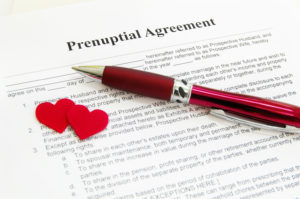 The divorce of New York real estate mogul Harry Macklowe and his wife, Linda, is about to get nasty.
The divorce of New York real estate mogul Harry Macklowe and his wife, Linda, is about to get nasty.
After 57 years of marriage, the billionaire announced he is moving in with his girlfriend of at least two years. The problem for Harry is that he does not have a prenuptial agreement. Linda is reportedly in control of the couple’s billion-dollar art collection and is expecting to keep it. According to a source, the couple is “going to fight for everything.”
Macklowe isn’t the first billionaire to get burned by failing to sign a prenup. Last year, Harold Hamm – founder of Continental Resources oil company – ended up signing a check for nearly $1 billion in his divorce, which is believed to be one of the largest divorce settlements in history.
The divorce process doesn’t really change regardless of the size of a person’s bank account, but high-net-worth individuals like Macklowe tend to have more complicated cases because they have more to lose.
“For this reason, a properly drafted and enforceable prenuptial agreement is crucial for high-net-worth marriages to protect the assets of the party bringing the majority of the wealth into the marriage, as well as ensure all parties are taken care of if the marriage results in divorce,” wrote Cordell & Cordell Principal Partner Joe Cordell.
The fact is, so many messy divorces could be avoided by signing a prenuptial agreement prior to marriage. Of course, the reason most couples fail to do this is that it requires them to envision a scenario where their marriage fails. Naturally, no couple wants to do that just as no couple ever expects their marriage to end in divorce.
It’s quite a paradox. Statistically speaking, any given marriage has a 40-50 percent chance of ending in divorce. That might not be romantic to consider, but it is reality.
However, when making the biggest financial decision of their lives, these are facts most couples ignore. As it pertains to marriage and divorce, far too many people fail to consider all of the potential financial ramifications.
Here are three potentially uncomfortable, but ultimately true, realities about prenuptial agreements.
A prenuptial agreement is not a harbinger for divorce
There is a silly and damaging notion that merely acknowledging the possibility of a divorce shows a lack of trust between spouses and increases the likelihood of divorce.
There is a big difference between not trusting your spouse and being realistic about the fact that unforeseen life changes can occur that affect you both.
Agreeing to marry someone is an enormous decision. You both need to be mature enough to have an honest, open discussion in order to safeguard you and your loved ones from potential financial hardship down the road.
Making sure you both are protected shouldn’t be a sign of distrust, but rather the complete opposite.
Prenuptial agreements are not only for the wealthy
It goes without saying that a prenup is more beneficial to someone who has accumulated a lot of wealth. After all, the more assets you have the more you stand to lose in divorce.
However, prenuptial agreements are not just for the rich. In fact, a Harris Interactive poll showed that about half of divorced people wish they had a prenup and 44 percent of single adults would want one.
Even if you enter a marriage without much wealth or many assets, a prenup can still be beneficial.
If you’re in the early stages of your career, you likely expect your income to increase over time and a prenup can help protect those future earnings.
On the other hand, a prenup can also help you avoid future debt by ensuring that you and your spouse do not become responsible for the other’s liabilities.
Finally, if you have children from another relationship, a prenup can ensure they are provided for by making sure IRA accounts, life insurance policies, and other assets are left to them rather than your spouse if something were to ever happen to you.
Prenuptial agreements are not always enforceable in divorce
It is true that prenups are recognized in all 50 states, but they can still be challenged and courts will occasionally invalidate prenpus.
There are a number of different reasons a prenuptial agreement might be revoked. Here are a few examples:
- If the agreement was obtained through fraud or through misrepresentation or nondisclosure of marital facts.
- If the stipulations in the agreement changed during the course of the marriage.
- If one of the parties was coerced into signing.
- If the paperwork wasn’t properly filed.
Although it is possible to write a prenup on your own, it is recommended to have a professional attorney experienced in prenuptial agreement preparation and your state’s divorce laws to draft the document for you. In fact, you and your spouse should both have independent counsel.


